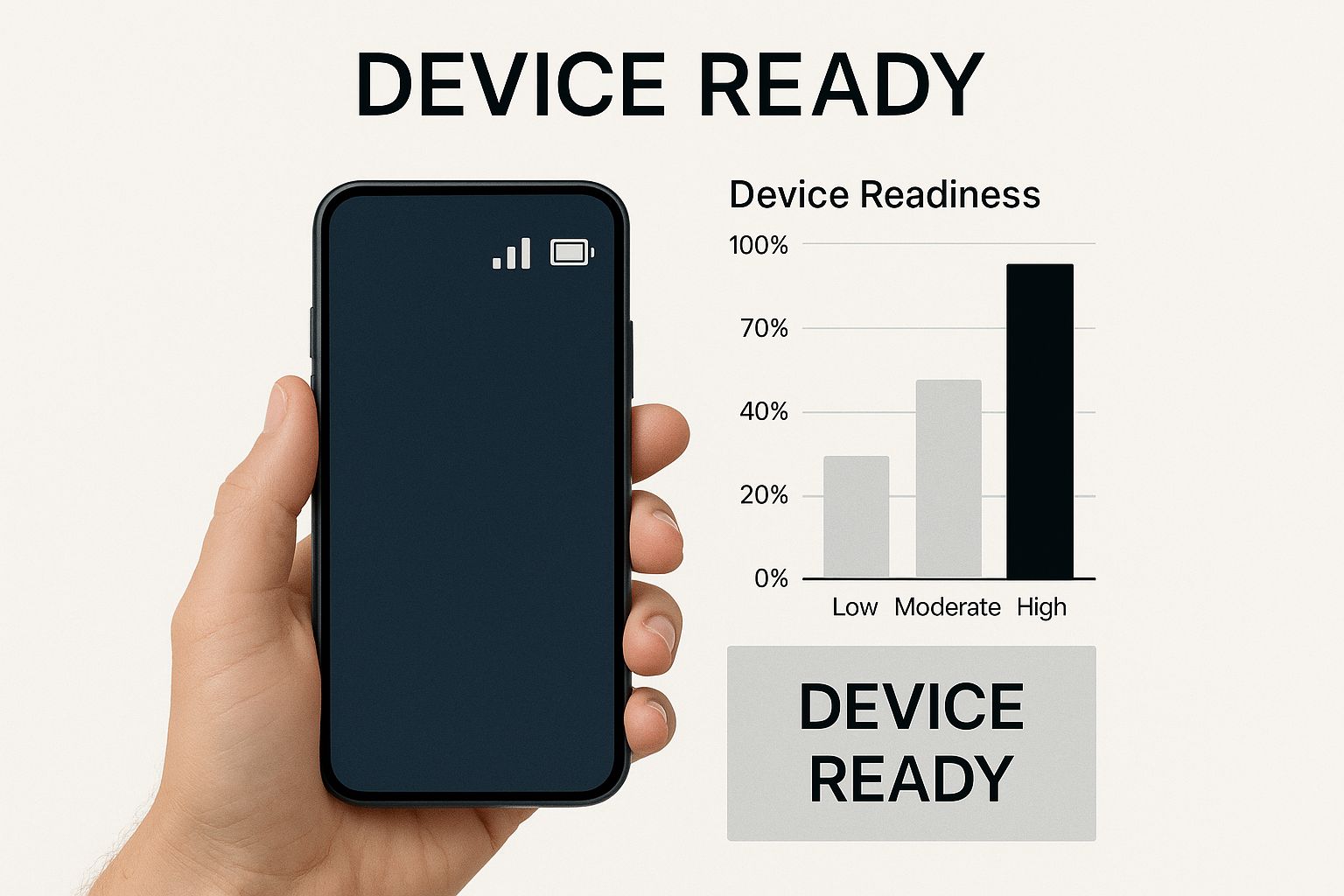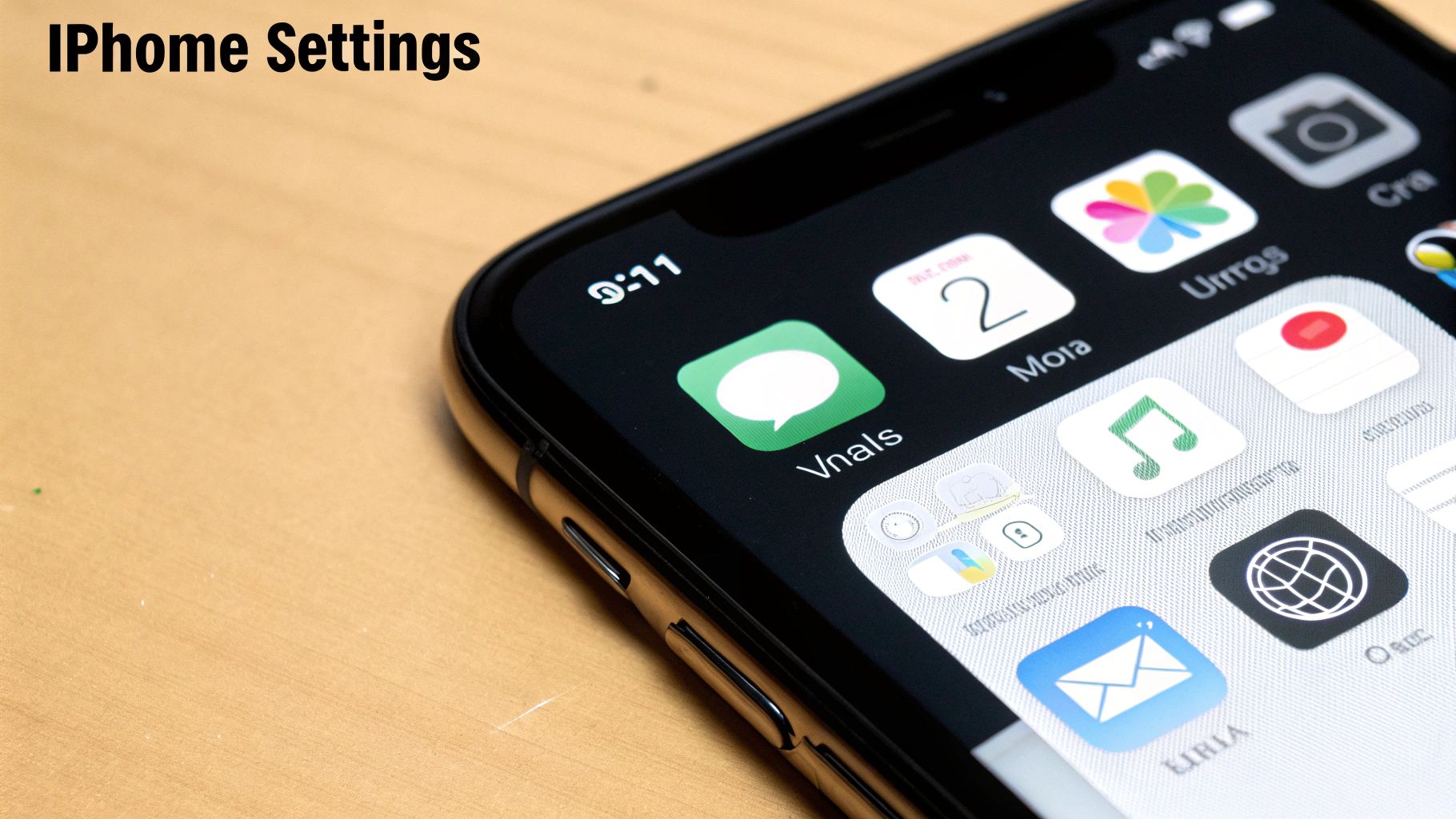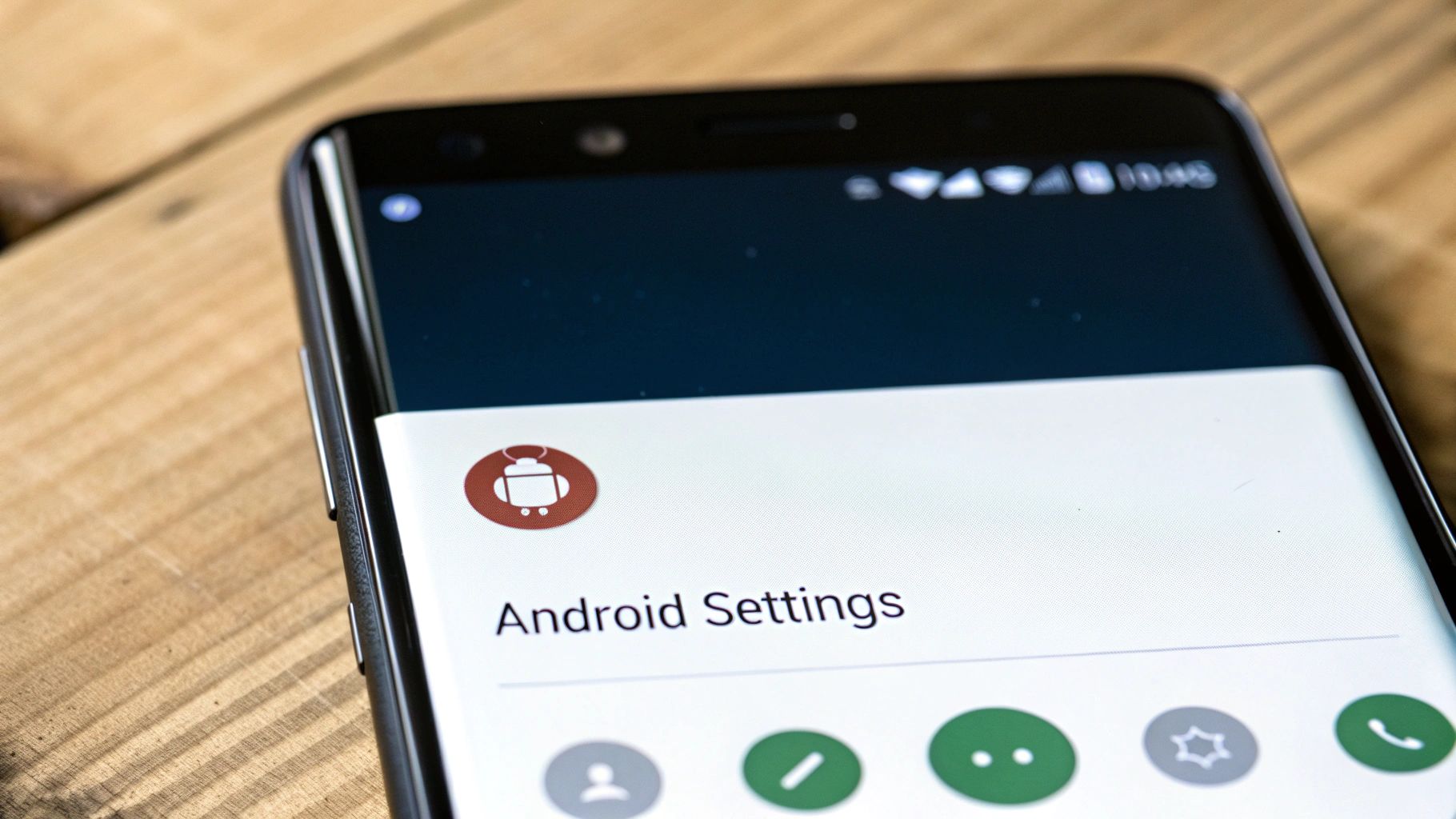It's a small detail that can cause surprisingly big problems. Ever miss an important message from a client or confuse a family member because your voicemail greeting was in a language they didn't understand? This is a more common headache than you'd think, creating a frustrating communication breakdown right when you need clarity the most.
You can usually tackle this directly through your cellular carrier, not your phone's built-in settings. The most common way is to simply call your own voicemail number and follow the audio prompts to find the language options. For many providers, you can also log into their app or website to make the change.
In a world where business and personal connections span the globe, making sure your voicemail is set to the right language is more than just a minor tweak—it's essential.
Think about it from a caller's perspective. An international client is trying to leave you a critical message, but they're met with a series of prompts they can't follow. That's a lost opportunity, right there. Or maybe you just moved to a new country or bought a phone from overseas, and the default language isn't one you speak fluently. Managing your messages becomes nearly impossible.
The fallout from a mismatched voicemail language can range from a simple annoyance to a major professional setback. I've seen it happen.
Here are a few ways this can bite you:
Taking a few minutes to get this setting right ensures your primary communication channel is open and accessible to everyone. It's a foundational step, and if you need a refresher, we cover the basics in our guide to setting up voicemail. Don't worry, the process is usually simpler than you expect.
If you’re hunting through your iPhone’s settings to change the voicemail language, you can stop now. It’s a common assumption, but that setting isn’t actually controlled by Apple or iOS. Your voicemail is a service managed entirely by your cellular carrier—whether that’s AT&T, Verizon, T-Mobile, or another provider.
This means you’ll have to go directly to the source. The most direct way is by calling your voicemail service right from your phone. Just open the Phone app, tap the Voicemail icon in the bottom-right corner, and your iPhone will connect you.
Once you're connected, you'll have to play a bit of a listening game. The system will guide you through a series of audio prompts. You're trying to find the menu for settings, personal options, or maybe mailbox features. Inside that menu, there should be an option for changing the language.
The exact button presses are different for every carrier, which can be a little frustrating.
The key here is patience. Listen to all the prompts before you make a choice. If you get turned around, don't worry—just hang up and dial back in to start fresh.
Pro Tip: Before you call, have your voicemail PIN or password ready. Most carriers will ask for it to get into your settings. Having it on hand will save you from getting stuck and having to call back.
Stuck in an endless loop of automated voice menus? There are usually better options. Most carriers have updated their systems, giving you much easier ways to manage your account without having to decipher audio prompts.
Instead of calling, try these two places first:
If you've ever tried to change your voicemail language on an Android, you might have hit a wall. That's because, unlike iPhones, the Android world is incredibly diverse. A Samsung phone on Verizon handles things differently than a Google Pixel on T-Mobile.
The key thing to remember is that your voicemail language isn't an Android setting—it's controlled by your cellular service provider. This means you'll have to go through them to make the change.
Most of the time, this involves calling into your voicemail. You can usually do this by holding down the 1 key on your dial pad. From there, you'll navigate a series of audio menus to find the language settings.

Before you dial in, it’s always a good idea to make sure your phone's software is up to date. This just helps ensure a smoother interaction with your carrier's automated systems.
Here’s where a little patience comes in handy. Each carrier designs its own voicemail menu, so you'll need to listen carefully to the prompts. You're generally looking for a menu with a name like “Administrative Options,” “Personal Settings,” or “Mailbox Setup.” Buried inside one of those, you should find the option to switch languages.
A Quick Word on Google Voice
If you happen to use Google Voice for your voicemail, you can breathe a sigh of relief. The process is a whole lot simpler. You can change the language directly inside the Google Voice app's settings, completely bypassing your mobile carrier.
To give you a better idea of what to expect, let’s look at how the process typically works for the major carriers. The process can change, but this is a solid starting point.
This table breaks down the common steps you'll encounter when trying to change your voicemail language through different providers. As you can see, the path is similar but with slight variations.
Ultimately, calling your carrier's voicemail system is the standard way to get this done on an Android device. Just be prepared to navigate a few menus to find what you're looking for.
Changing the language on a landline voicemail can feel a bit like stepping back in time, but plenty of homes and businesses still depend on these trusty systems. The process usually involves dialing into your voicemail and navigating an old-school audio menu with your keypad.

You'll have to listen carefully for prompts like “personal options” or “mailbox settings.” Once you're in the right spot, you can typically find the language configuration. If you're dealing with a business PBX system, though, this option might be locked down. In that case, you'll need to get in touch with a system administrator to make the change for you.
Thankfully, if you're using a modern Voice over IP (VoIP) service like Ooma or Vonage, the experience is much smoother. These providers almost always have a user-friendly online portal. You just log in and change your voicemail language with a few simple clicks—no need to suffer through those tedious audio menus.
The global voicemail market is rapidly shifting from analog to integrated digital platforms, which has pushed demand for a better user experience. According to recent research on the future of voicemail services, this trend has made multi-language support a completely standard feature.
This move to digital unlocks some seriously powerful features that go way beyond just language settings.
By modernizing your system, you not only make language changes easier but also open the door to features like voicemail-to-email transcription and more sophisticated call handling. This is key for providing a professional and accessible experience for all your callers.
No matter what kind of system you have, a clear and professional greeting is non-negotiable. For some great tips, check out our guide on how to make a custom voicemail that will impress every single person who calls.
Let's be honest, manually fiddling with voicemail settings is a chore. For any business trying to connect with a diverse customer base, it's more than just a hassle—it’s a barrier. When you need to move beyond a single, static language, you need a solution that’s as dynamic as your clientele. This is exactly where an intelligent AI receptionist completely changes the game.

Instead of pushing every caller through the same one-size-fits-all funnel, an AI receptionist can greet them in a default language and then adapt on the fly. Picture this: a customer calls your business and starts speaking Spanish. The AI instantly picks up on it and seamlessly switches its responses to match. Now that's a welcoming and professional first impression.
With a platform like My AI Front Desk, setting up greetings, call routing instructions, and even booking information in multiple languages is incredibly straightforward. You can do it all right from a central dashboard. We're not just talking about how to change voicemail language anymore; this is about building a more inclusive and accessible front door for your business.
You can easily set up responses for common languages your customers might speak, such as:
This proactive approach means no customer ever feels lost or ignored because of a language barrier. It’s this kind of automation that's fueling serious growth in communication tech. In fact, the voicemail transcription services market, already valued at $1.47 billion, is projected to grow by 11% annually through 2033, driven largely by AI and the rising demand for multilingual support. You can read more about the growth of voicemail services here.
This technology gives businesses the power to offer a truly global customer experience without needing a multilingual human staff on call 24/7. It ensures every single caller is understood and assisted properly.
Ultimately, this moves the conversation beyond just tweaking settings and into creating a sophisticated, automated communication strategy. If you're ready to elevate your customer interactions, take a look at our guide on achieving multilingual mastery with My AI Front Desk. It's a powerful step toward a more professional and welcoming business presence.
It's one thing to know how to change your voicemail language, but sometimes you run into weird little quirks that leave you scratching your head. Let's tackle some of the most common questions that pop up.
One of the first things people try is asking their phone's built-in helper. But here's the deal: you can't just tell Siri or Google Assistant to change your voicemail language. That's because the language setting isn't controlled by your phone's software—it's handled directly by your carrier's network. You have to go through their system to make the change.
Okay, so you've dialed into your voicemail, listened to every single prompt, and the language menu is nowhere to be found. It’s frustrating, but don't give up.
Carriers can be a little notorious for tucking this setting away in unexpected places. I've seen it hidden under menus like "Mailbox Security" or "Personal Options" before. If you've poked around and still come up empty, your best bet is to hang up and check your carrier's website or mobile app.
Still no luck? A quick call to customer service is the most direct path. Just make sure you have your account information handy to speed things up.
This is probably the most common mix-up I see. Changing your phone’s system language—the text you see in menus, settings, and apps—has zero effect on the audio prompts in your voicemail.
Think of them as two completely separate things. Your phone's operating system is one world, and your carrier's voicemail service is another. You have to change the voicemail language on its own.
A good rule of thumb is to remember that your phone's settings and your voicemail service operate independently. One is managed by the device manufacturer (like Apple or Google), and the other is controlled entirely by your mobile carrier. Always treat them as separate tasks.
For businesses that want to go beyond basic voicemail and provide a truly professional, multilingual experience, you might want to explore how to configure multiple languages on your AI receptionist.
Ready to provide a seamless, multilingual experience for every caller without the hassle of traditional voicemail? My AI Front Desk offers an AI-powered receptionist that can communicate in dozens of languages, ensuring no customer is ever left behind. Visit https://myaifrontdesk.com to see how our intelligent solution can help you convert more leads and grow your business.
Start your free trial for My AI Front Desk today, it takes minutes to setup!








